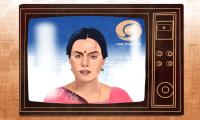The political turmoil that swept Karnataka after the 2004 fractured verdict in the assembly polls continued to haunt the state, claiming two coalition governments so far with chances of yet another coming to power.
The state has also been battered by administrative chaos due to political instability in the coalition era notwithstanding the Congress-Janata Dal Secular and JDS-BJP dispensations' claims of having ensured development.
When Congress-JDS shook hands after May 2004 assembly elections none in the state visualised that it will mark the beginning of a political instability in the state.
The Congress-JDS coalition government installed on 'secular plank' that brought these two parties together, had a bumpy ride from the beginning in the wake of JDS supremo H D Deve Gowda holding the trigger.
N Dharam Singh who became the first chief minister to lead a coalition government spent most of his time and energy in placating an ever agitated Gowda and could hardly devote time for governance.
Though BJP emerged as the single largest party with 79 seats and the Congress, which was humbled in the hustings, took the second spot winning 64 seats, it was JDS' H D Deve Gowda who called the shots, even as his party finished a poor third with 58 seats.
As if by design or in tune with his political machinations, Gowda rejected BJP's offer to form the government, tapped the doors of Congress and succeeded.
With Congress-JDS completing less than a year in office, Gowda raised hue and cry that his coalition partner Congress was trying to split his party.
In the midst of these anti-Congress campaign, Gowda made preparation for the ouster of Siddaramaiah, the former deputy chief minister from the party, blaming that the backward class leader was associated with the AHINDA (a non-politial organisation of dalits, backward classes and minorities).
After winning the confidence of Congress, Gowda successfully stripped Siddaramaiah of his ministerial berth and removed him as the leader of the legislature party. With these actions Gowda warded off challenge to his authority that would have come from Siddaramaiah, who was second in command in the party and his claims to the chief minister's post.
With the Dharam Singh government set to complete 20 months in office, Gowda's son H D Kumarasawmy staged a political coup, brought down the Congress-JDS ministry and anointed himself as the chief minister of the JDS-BJP ministry.
Gowda, who initially presented a picture of opposition to his son's government, called BJP as communal hoping to retain his 'secular image,' however, justified JDS joining hands with saffron party.
Gowda who was supremely happy with his son becoming chief minister and another son H D Revanna, holding two key-portfolios, stood by the JDS-BJP government for about a year.
The 20-20 month power sharing pact entered into by Kumaraswamy with BJP kept Gowda worrying as at the end of the tenure, his son will have to step down.
Soon after BJP leader B S Yediyurappa, who held Finance portfolio, presented his second budget during this march, Gowda started taking pot shots at his coalition partner and issued veiled threats over power transfer, which he translated into action later.
In the wake of JDS bringing down the coalition, Congress camp has become active again to install its own government.
Though all the political parties have been openly making statements that they will go to people's court, backroom strategists of the Congress are wooing disgruntled JDS MLAs.
Several MLAs privately have expressed unhappiness reneging on its power transfer assurance to BJP and fear backlash in their constituencies. Congress is willing to rule, if JDS men break, form a separate group and join it.
Will the state witness one more government or face mid-term polls is the question that remains unanswered now.








